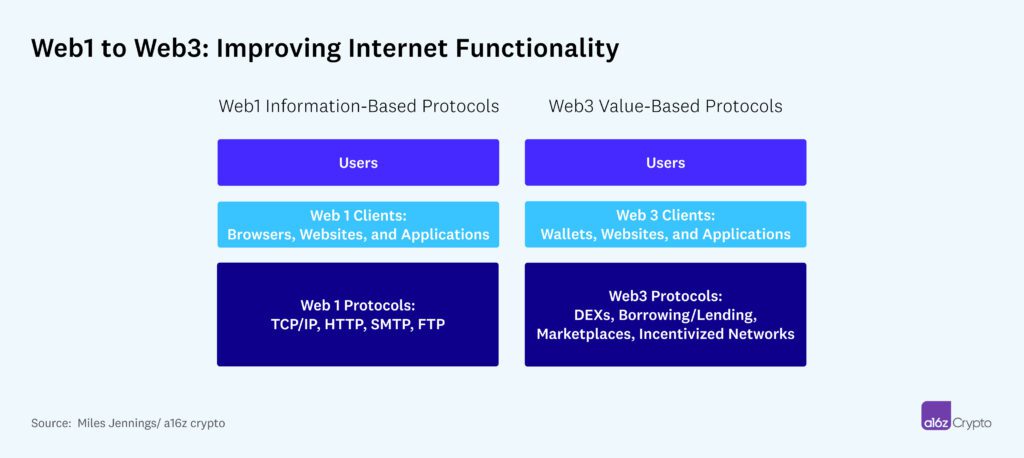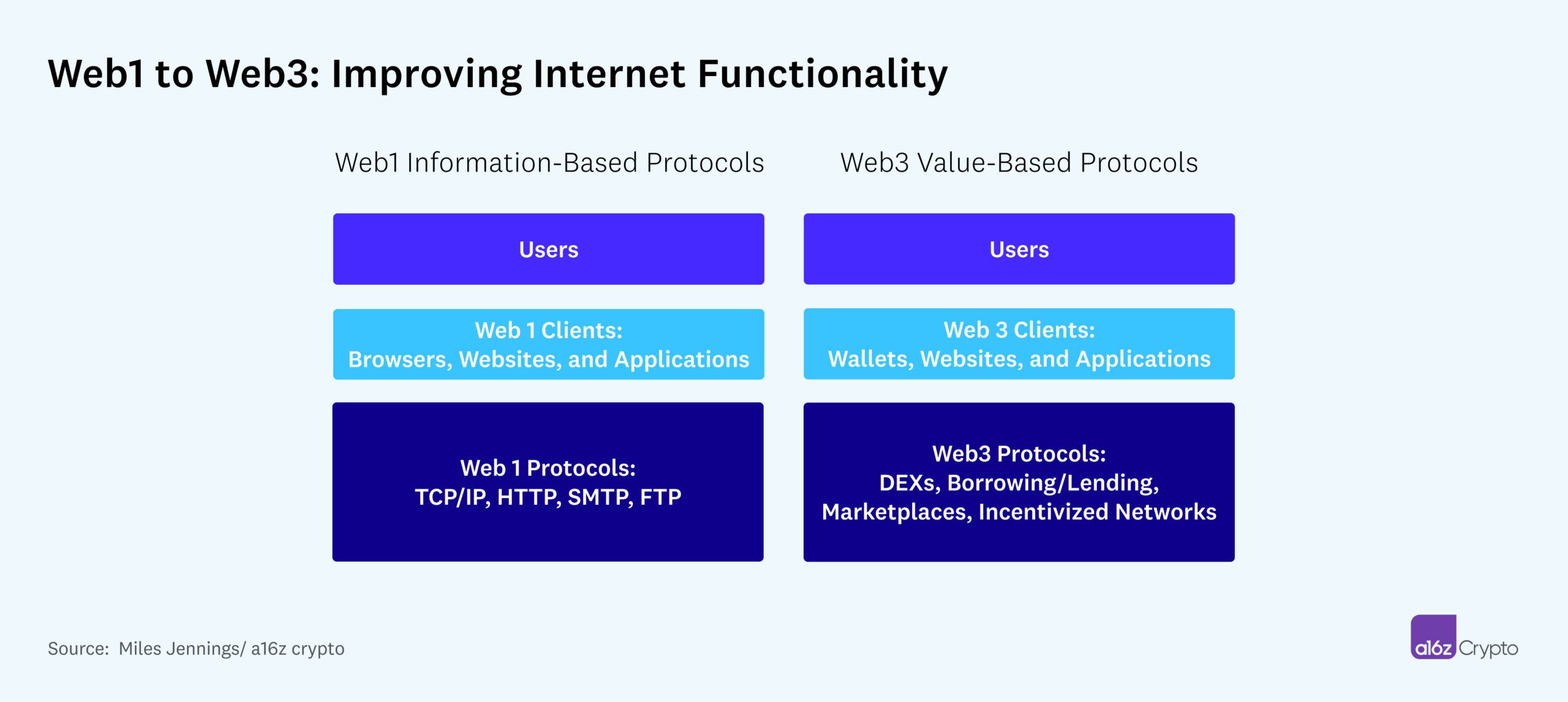Many early proponents of the web advocated for it to stay free and open in perpetuity, a borderless and regulation-free software for all of humanity. That imaginative and prescient misplaced some readability over the previous 20 years as governments cracked down on misuse. And but, regardless of this, a lot of the know-how underlying the web – communications protocols resembling HTTP (knowledge change for web sites), SMTP (e mail), and FTP (file transfers) – remained as free and open as ever.
Governments world wide preserved the web’s promise by accepting that the know-how relies upon upon open-source, decentralized, autonomous, and standardized protocols. When the U.S. handed the Scientific and Superior Expertise Act of 1992, it paved the best way for a industrial web increase with out tampering with TCP/IP, the protocol for pc networking. When Congress handed the Telecommunications Act of 1996, it didn’t intrude with the best way knowledge traverses networks, but nonetheless offered sufficient readability to allow the U.S. to dominate the web financial system with now-giants resembling Alphabet, Amazon, Apple, Fb, and others. Whereas no laws is ideal, these guardrails allowed business and innovation to develop, leading to lots of the web companies we get pleasure from right this moment.
One of many main enabling components: As a substitute of regulating protocols, governments sought to manage the apps – functions like browsers, web sites, and different user-facing software program, generally known as “purchasers” – by means of which customers entry the net. This similar guideline which nonetheless governs the net ought to prolong to web3, an evolution of the web that may function new apps or purchasers, resembling webapps and wallets, and superior decentralized protocols, together with a settlement layer for worth change, enabled by blockchains and sensible contracts. The query isn’t whether or not there ought to or shouldn’t be web3 regulation. The reply to that’s apparent: Guidelines are mandatory, welcome, and warranted. The query is, somewhat, at which layer of the tech stack does web3 regulation take advantage of sense.

In the present day, a typical net consumer expertise would possibly contain connecting by means of a regulated web service supplier, then accessing data by means of regulated browsers, web sites, and functions, a lot of which rely upon free and open protocols. Governments can form this expertise on the net by making use of entry restrictions to web site content material, or by requiring compliance with privateness guidelines and copyright takedown requests. That is how the U.S. can compel YouTube to take down a terrorist recruitment video, whereas leaving DASH (a video streaming protocol) alone.
There are a couple of the reason why protocol-level regulation is undesirable and, furthermore, unworkable. First, it’s not technologically potential for protocols to adjust to laws, which regularly require indefinable, subjective determinations. Second, it’s impractical for protocols to include world laws, which differ – and should conflict – by jurisdiction. And third, it’s pointless and counterproductive to rewrite the net’s technical underpinnings provided that apps or purchasers can adjust to laws additional up the tech stack.
Let’s evaluate every cause in additional element.
Protocols can’t technically adjust to subjective laws
No matter how well-intentioned a regulation could also be, if it requires subjective assessments, its software to protocols might be disastrous.
Think about spam. Hatred for spam e mail is almost common, however what would the net of right this moment seem like if authorities made it unlawful for the e-mail protocol (SMTP) to facilitate the sending of spam? The reply: not good. What constitutes junk e mail is inherently subjective and adjustments over time. Huge corporations like Google spend fortunes making an attempt to get rid of spam from their e mail apps or purchasers (e.g., Gmail) – they usually nonetheless get it fallacious. As well as, even when some authority mandated that SMTP filter spam by default, malicious actors might, as a result of protocols are open supply, merely reverse engineer the filter with the intention to circumvent it. In consequence, prohibiting SMTP from facilitating the sending of spam would both be ineffective or the tip of e mail as we all know it.
In web3, we are able to analogize tokens to e mail within the context of a decentralized change protocol (DEX). If governments want to prohibit the change of sure tokens they consider could also be securities or derivatives utilizing such a protocol, they want to have the ability to articulate technical specs that objectively meet such classification. However such goal classification standards should not potential. The willpower of whether or not an asset is a safety or by-product is subjective and requires an evaluation of details and legal guidelines. Even the U.S. Securities and Alternate Fee struggles with this.
Making an attempt to embed second-order, subjective analyses into base layer instruction units is an train in futility. Simply as with SMTP, there’s no manner for a decentralized and autonomous protocol like a DEX to carry out a subjective evaluation with out including human intermediaries, thereby negating the protocol’s decentralization and autonomy. In consequence, the applying of such laws to DEXs would successfully ban such protocols, thus outlawing a burgeoning class of tech innovation in its entirety and jeopardizing the viability of all of web3.
Protocols can’t virtually adjust to world laws
Even when it had been technologically potential to construct protocols able to making complicated and subjective selections, doing so could be impractical on a world scale.
Think about the morass of conflicts. SMTP permits us to ship e mail to anybody on the earth, but when the U.S. required SMTP to filter spam e mail, we are able to assume that overseas governments would require comparable restrictions. Additional, as a result of what constitutes spam is subjective, we are able to additionally assume that governments’ necessities would differ. So, even when it had been technologically potential to construct protocols able to making complicated and subjective selections, doing so is antithetical to the idea of creating a typical that’s sensible on a world scale. It’s merely not potential for SMTP to include the altering spam filter necessities of 195 nations, and even when the protocol might, it wouldn’t know what nation customers are in and the way to prioritize competing determinations with any equity. Including subjectivity to protocols destroys one of many pillars that makes them helpful: standardization.
Guidelines are context dependent. In web3, what’s permissible beneath securities and derivatives legal guidelines varies by nation, and people legal guidelines change on a regular basis. A DEX has no manner of creating a world normal for such legal guidelines and, like SMTP, has no technique to curtail entry primarily based on geography. In the end, there’s no manner for protocols to achieve success if they’re required to be constructed on prime of the shifting sands of worldwide regulation.
Keep away from these issues by making apps or purchasers comply
By now it must be apparent why it’s vital to manage apps as a substitute of protocols. App-level regulation can accomplish the targets of governments with out jeopardizing the underlying know-how. We all know this as a result of the method already works.
Early net protocols stay helpful after greater than 30 years as a result of they proceed to be open supply, decentralized, autonomous, and standardized. However governments can prohibit the data passing by means of these protocols by regulating apps. Or they will defend the free circulate of knowledge, because the U.S. did by approving Part 230 of the Communications Decency Act of 1996. Every nation can decide its personal method and the companies that function browsers, web sites, and functions of their respective jurisdictions are able to tailoring merchandise to adjust to such selections.
Because the dichotomy between protocols and apps is similar in web3, the regulatory method to web3 ought to keep the identical. Web3 apps like wallets, webapps, and different functions allow customers to deposit digital belongings in liquidity swimming pools of lending protocols, to purchase NFTs by means of market protocols, and to commerce belongings on DEXs. These wallets, web sites, and functions may be regulated in each jurisdiction the place they search to supply entry, and it’s affordable to require them to conform.
The primary technology of the net gave us unbelievable instruments within the type of networking, knowledge change, e mail, and file switch protocols, all of which made it potential to maneuver data on the pace of the web. Web3 makes it potential for the switch of worth to happen at that pace, with lending and asset change already being accessible as native capabilities of this new web. That is an unbelievable public good that have to be protected. As web3 expands from decentralized finance, or “DeFi,” to video video games, social media, creator economies, and gig economies, regulation that creates a degree enjoying subject throughout these sectors will develop into much more vital. Weighing all of the components, the fitting method turns into readily obvious.
Apps should be regulated, not protocols.
***
Editor: Robert Hackett, @rhhackett
***
The views expressed listed below are these of the person AH Capital Administration, L.L.C. (“a16z”) personnel quoted and should not the views of a16z or its associates. Sure data contained in right here has been obtained from third-party sources, together with from portfolio corporations of funds managed by a16z. Whereas taken from sources believed to be dependable, a16z has not independently verified such data and makes no representations in regards to the present or enduring accuracy of the data or its appropriateness for a given scenario. As well as, this content material might embody third-party ads; a16z has not reviewed such ads and doesn’t endorse any promoting content material contained therein.
This content material is offered for informational functions solely, and shouldn’t be relied upon as authorized, enterprise, funding, or tax recommendation. It is best to seek the advice of your personal advisers as to these issues. References to any securities or digital belongings are for illustrative functions solely, and don’t represent an funding advice or provide to supply funding advisory companies. Moreover, this content material isn’t directed at nor meant to be used by any traders or potential traders, and should not beneath any circumstances be relied upon when making a call to spend money on any fund managed by a16z. (An providing to spend money on an a16z fund might be made solely by the non-public placement memorandum, subscription settlement, and different related documentation of any such fund and must be learn of their entirety.) Any investments or portfolio corporations talked about, referred to, or described should not consultant of all investments in automobiles managed by a16z, and there may be no assurance that the investments might be worthwhile or that different investments made sooner or later may have comparable traits or outcomes. A listing of investments made by funds managed by Andreessen Horowitz (excluding investments for which the issuer has not offered permission for a16z to reveal publicly in addition to unannounced investments in publicly traded digital belongings) is accessible at https://a16z.com/investments/.
Charts and graphs offered inside are for informational functions solely and shouldn’t be relied upon when making any funding resolution. Previous efficiency isn’t indicative of future outcomes. The content material speaks solely as of the date indicated. Any projections, estimates, forecasts, targets, prospects, and/or opinions expressed in these supplies are topic to alter with out discover and should differ or be opposite to opinions expressed by others. Please see https://a16z.com/disclosures for extra vital data.


